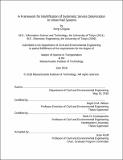| dc.contributor.advisor | Nigel H.M. Wilson and Haris N. Koutsopoulos. | en_US |
| dc.contributor.author | Chigusa, Kenji | en_US |
| dc.contributor.other | Massachusetts Institute of Technology. Department of Civil and Environmental Engineering. | en_US |
| dc.date.accessioned | 2018-11-28T15:25:30Z | |
| dc.date.available | 2018-11-28T15:25:30Z | |
| dc.date.copyright | 2018 | en_US |
| dc.date.issued | 2018 | en_US |
| dc.identifier.uri | http://hdl.handle.net/1721.1/119274 | |
| dc.description | Thesis: S.M. in Transportation, Massachusetts Institute of Technology, Department of Civil and Environmental Engineering, 2018. | en_US |
| dc.description | This electronic version was submitted by the student author. The certified thesis is available in the Institute Archives and Special Collections. | en_US |
| dc.description | Cataloged from student-submitted PDF version of thesis. | en_US |
| dc.description | Includes bibliographical references (pages 107-109). | en_US |
| dc.description.abstract | With the increasing availability of transit information from well-developed apps, urban rail passengers are more and more aware of how long their journeys should take. This also means that passengers are becoming more sensitive to the gap between the service they expect of and what was actually provided. On the other hand, in urban rail systems operating high frequency services along with heavy ridership, trains could be frequently delayed due to less buffer time and passenger surges at platforms. In addition, passengers could experience further service deterioration resulting from overcrowding both in stations and trains. Passengers may be forced to miss several trains due to train capacity constraints. These passengers' out-of-vehicle experience is becoming a serious concern which has not been fully captured by conventional performance measures. This thesis develops a framework for identifying systematic service deterioration from the passengers' perspective in urban rail systems operating near-capacity. This framework aims to support rail agencies' problem understanding and management in the interest of service improvement. Specifically, the framework uses excess journey time as a proxy for the gap between service expectation and passenger experience. Using train-flow and passenger-flow data from automatic vehicle location and automatic fare collection systems, the framework estimates journey time for each origin and destination station pair, and time period in excess of the standard journey time used as a reference. Based on the median excess journey time, the framework identifies the time, location, frequency, degree, and (in some cases) causes of service deterioration. Guidelines for countermeasures and further analyses are also provided. The main use of the framework is for periodic problem identification, but it can also support before and after analysis regarding service changes. The framework is tested and demonstrated by applying it to a line of Hong Kong Mass Transit Railway, which is one of the most heavily utilized rail systems in the world. The results of analysis are hotspots which identify points of significant passengers' out-of-vehicle experience deterioration. The analysis further indicates unexpected passengers' detouring behaviors to pursue less crowded trains. A before and after analysis focusing on the impact of a line extension shows that passengers traveling from a specific station are likely to experience greater service deterioration after the extension. | en_US |
| dc.description.statementofresponsibility | by Kenji Chigusa. | en_US |
| dc.format.extent | 109 pages | en_US |
| dc.language.iso | eng | en_US |
| dc.publisher | Massachusetts Institute of Technology | en_US |
| dc.rights | MIT theses are protected by copyright. They may be viewed, downloaded, or printed from this source but further reproduction or distribution in any format is prohibited without written permission. | en_US |
| dc.rights.uri | http://dspace.mit.edu/handle/1721.1/7582 | en_US |
| dc.subject | Civil and Environmental Engineering. | en_US |
| dc.title | A framework for identification of systematic service deterioration in urban rail systems | en_US |
| dc.type | Thesis | en_US |
| dc.description.degree | S.M. in Transportation | en_US |
| dc.contributor.department | Massachusetts Institute of Technology. Department of Civil and Environmental Engineering | |
| dc.identifier.oclc | 1065522887 | en_US |
